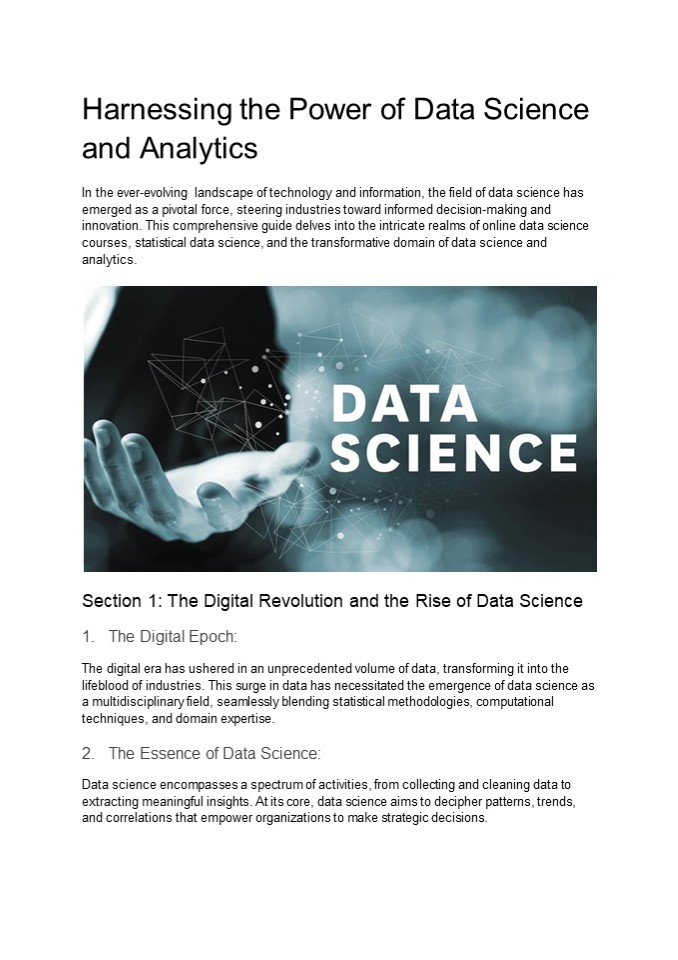Harnessing the Power of Data Science and Analytics - PowerPoint PPT Presentation
Title:
Harnessing the Power of Data Science and Analytics
Description:
In the ever-evolving landscape of technology and information, the field of data science has emerged as a pivotal force, steering industries toward informed decision-making and innovation. This comprehensive guide delves into the intricate realms of online data science courses, statistical data science, and the transformative domain of data science and analytics. – PowerPoint PPT presentation
Number of Views:0
Title: Harnessing the Power of Data Science and Analytics
1
Harnessing the Power of Data Science and
Analytics
In the ever-evolving landscape of technology and
information, the field of data science has
emerged as a pivotal force, steering industries
toward informed decision-making and innovation.
This comprehensive guide delves into the
intricate realms of online data science courses,
statistical data science, and the transformative
domain of data science and analytics.
- Section 1 The Digital Revolution and the Rise of
Data Science - The Digital Epoch
- The digital era has ushered in an unprecedented
volume of data, transforming it into the
lifeblood of industries. This surge in data has
necessitated the emergence of data science as a
multidisciplinary field, seamlessly blending
statistical methodologies, computational
techniques, and domain expertise. - The Essence of Data Science
- Data science encompasses a spectrum of
activities, from collecting and cleaning data to
extracting meaningful insights. At its core, data
science aims to decipher patterns, trends, and
correlations that empower organizations to make
strategic decisions.
2
- Section 2 The Dynamics of Online Data Science
Courses - The Paradigm Shift in Learning
- Online education has revolutionized the way
individuals acquire new skills, and data science
is no exception. Data science course online offer
a flexible and accessible avenue for enthusiasts
to delve into the intricacies of this field. - Navigating the Online Learning Landscape
- The online data science course landscape is
diverse, catering to beginners and seasoned
professionals alike. From foundational concepts
to advanced machine learning algorithms, these
courses provide a structured pathway to mastering
the art and science of data. - Section 3 Statistical Data Science Unveiled
- The Crucial Role of Statistics
- Statistics serves as the bedrock of data
science, providing the tools and - methodologies to make sense of raw data.
Statistical data science involves the application
of statistical principles to glean meaningful
insights and draw informed conclusions. - Statistical Techniques in Data Science
- From descriptive statistics that summarize and
visualize data to inferential statistics that
make predictions and inferences, statistical
techniques play a pivotal role in the data
scientist's toolkit. Exploratory Data Analysis
(EDA) and hypothesis testing are essential
components that guide the data science journey. - Section 4 Navigating the Landscape of Data
Science and Analytics - Data Science in Action
- Data science finds applications across diverse
sectors. Business intelligence, predictive
analytics, healthcare analytics, and fraud
detection are just a few areas where data science
is instrumental in transforming raw data into
actionable insights.
3
Section 5 Choosing the Right Path Data Science
Certification 5.1 The Relevance of
Certification As the demand for skilled data
scientists continues to soar, certifications have
become valuable credentials that validate one's
expertise. Data science certification programs
offer a structured curriculum to equip learners
with the necessary skills.
5.2 Noteworthy Data Science Certification
Programs H2kinfosys stands out as a leading
provider of online training courses for data
science. Their comprehensive and interactive
courses cover data analysis, machine learning,
data visualization, and more. Other recognized
certifications include Microsoft Certified Azure
Data Scientist Associate, IBM Data Science
Professional Certificate, and Coursera Data
Science Specialization. Section 6 The Future
Landscape of Data Science and Analytics 6.1
Automation and Artificial Intelligence As
technology advances, automation and artificial
intelligence are poised to play a more prominent
role in data science. Automated machine learning
(AutoML) tools are simplifying the
model-building process, making data science more
accessible.
4
6.2 Ethical Considerations The ethical
implications of data science and analytics are
garnering increased attention. Issues related to
bias in algorithms, data privacy, and
transparency are prompting discussions within
the industry. Future developments are likely to
involve stricter ethical guidelines and
frameworks.
Conclusion In the dynamic landscape of data
science, the convergence of statistical
methodologies, online education, and analytics
reshapes how we perceive and leverage data.
Whether embarking on an online data science
course, delving into statistical intricacies, or
exploring the broader domain of data science and
analytics, the journey is both transformative and
intellectually rewarding. As the data-driven
future unfolds, mastery in data science remains
an invaluable asset, steering individuals and
organizations toward innovation and strategic
excellence.































